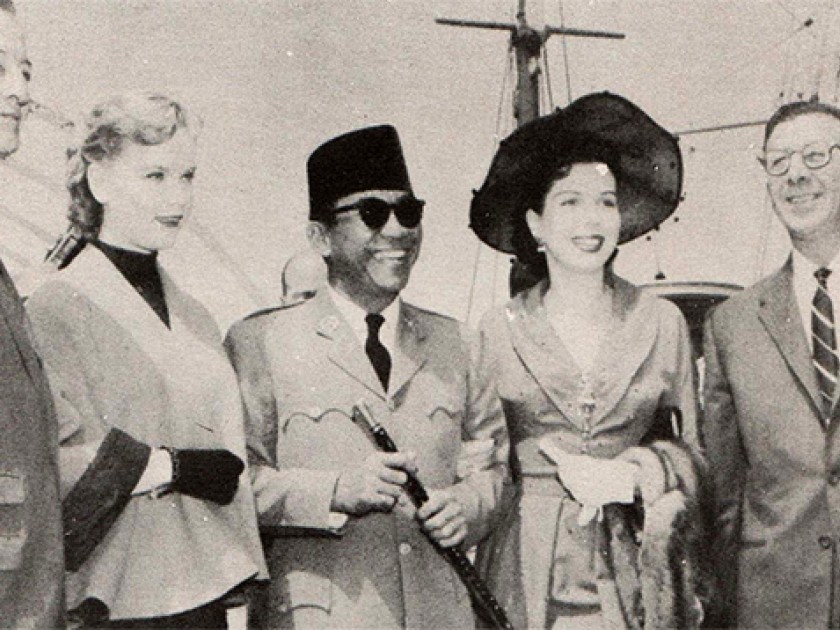
Earlier this week, Glenn Frankel considered the overwhelmingly Jewish history of the Hollywood Blacklist, the subject of his new book High Noon: The Hollywood Blacklist and the Making of an American Classic. Glenn is guest blogging for the Jewish Book Council all week as part of the Visiting Scribe series here on The ProsenPeople.
While most of Hollywood’s founding fathers were Jewish, they weren’t exactly the kind of proud, high-profile American Jews we know and celebrate today. Most were immigrants or first-generation Americans, and they generally tended to hide their Jewish identity (and their politics) out of personal embarrassment or fear.
One notable exception, as I found out while researching and writing my new book, High Noon: The Hollywood Blacklist and the Making of an American Classic, was Dore Schary, an outspoken liberal Democrat and ardent Zionist. Schary interested me because he attempted to navigate a middle course in perilous times: although he was an anti-Communist himself, he he fought the Hollywood inquisition out of firm belief in civil liberties.
Born in Newark to Russian Jewish immigrants, Schary had risen from waiting tables at his family’s run-down resort hotel to writing and acting in floor shows in the Borscht Belt and later on Broadway. He arrived in Hollywood in 1932 at age 27 and was an immediate success at writing screenplays and producing films. In 1947 he became head of RKO, a small, feisty studio, promising to make socially meaningful pictures for modern post-war audiences. He quickly commissioned the noir-ish Crossfire (1947), one of the first mainstream films to focus on antisemitism, despite warnings from establishment groups like the American Jewish Committee that the film would only inflame religious hatred. (Instead, the film made a sizeable profit and garnered five Oscar nominations, including Best Picture.) Later that year, when the House Un-American Activities Committee staged its first public hearings into alleged Communist infiltration of Hollywood, Schary was the only studio head to publicly defend employing leftist screenwriters, actors and directors. Unless they advocated the violent overthrow of the government, Schary testified, people should be hired and fired based on their qualifications and not their politics.
But politicians in both parties fanned public fears about waves of Soviet agents and secret subversives who were undermining America. After Congress issued contempt citations against ten witnesses who refused to cooperate in answering the Committee’s questions, Schary’s fellow studio heads and their lawyers met secretly and issued a statement pledging to fire anyone found to be a Communist. Schary opposed the idea but was outvoted and ultimately felt compelled to go along: he wound up firing the director and producer who had made Crossfire, despite his great admiration for them both. And when he moved to head of production at MGM the following year, Schary faithfully enforced the new rules to the letter, requiring employees to sign loyalty oaths or lose their jobs.
Still, Schary found himself branded as Commie sympathizer. In a 1947 FBI memo, a confidential informant reported that “Mr. Schary in all respects has been a follower of the Communist Party line for many years.” Three years later, in a meeting with the head of the FBI’s Los Angeles office, Schary pledged to cooperate wholeheartedly with the bureau. He even made an anti-Communist propaganda film for the government.
After he was fired by MGM in 1956, Schary moved to New York, where he became National Chairman of the Anti-Defamation League of B’nai B’rith and wrote the hit play Sunrise at Campobello, about Franklin Roosevelt’s triumph over polio. It was his ode to enlightened liberal leadership. But the Red Scare had defeated well-meaning liberals like Schary. His last word on the Hollywood blacklist in his memoirs was one of deep regret: “A heavy cost in courage was paid by the industry, and a dreadful price was paid by those we could not protect.”
Glenn Frankel worked for many years for The Washington Post, serving as bureau chief in London, Southern Africa, and Jerusalem, where he won the 1989 Pulitzer Prize for International Reporting. He has taught journalism at Stanford University and the University of Texas at Austin, where he directed the School of Journalism. He is the author of five books, has won a National Jewish Book Award, and was a finalist for The Los Angeles Times Book Prize. He has been a Motion Picture Academy Film Scholar and a research fellow at the Leon Levy Center for Biography at the City University of New York. Rivonia’s Children, first published in 1999 and republished in 2024 by Blue Ear Books, was a finalist for the Alan Paton Prize, South Africa’s highest honor for nonfiction.